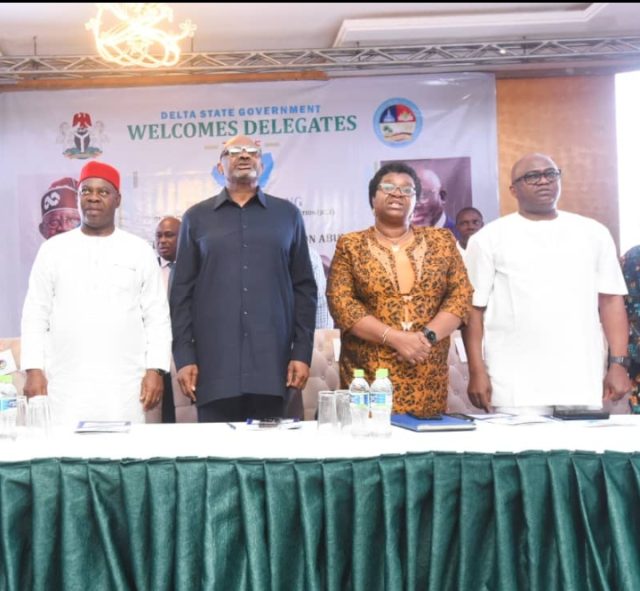Delta State Governor, Rt. Hon. Sheriff Oborevwori, has called on critical stakeholders to come up with policies that will elevate Nigeria’s education sector.
He made the call in Asaba at the opening ceremony of the 84th Joint Consultative Committee On Education (JCCE) Plenary Meeting being hosted by Delta State.
The Governor, who was represented by his Deputy, Sir Monday Onyeme, FCA, charged participants at the meeting to make policy decisions that would elevate Nigeria to new heights of academic excellence, equity and socio-economic prosperity.
Oborevwori said in recognition of the importance of well-trained and professional teachers to determining students’ performance and achievement, the Delta State Government, in 2016, established a Teachers’ Professional Development Centre for regular in-service training.
The Governor pointed out that the Centre had not only remained functional, but had continued to train and support both newly employed and experienced teachers with the data, tools, and knowledge needed for effective teaching and better student outcomes.
“The JCCE stands as a platform where educational policies are thoroughly deliberated, thoughtfully refined, and strategically aligned with Nigeria’s broader aspirations.
“As we gather here in Delta, let us harness the power of collaboration, innovation and unity; turning challenges into opportunities, and moving our education system forward”, he said.
The Governor described as apt, the theme of the Plenary Meeting: “Quality Education Data and Professionalisation of Teaching: A Tool for Enhanced National Development”, stating that one of Nigeria’s major drawbacks was the absence of data in virtually all sectors of the national economy.
This, he noted, had made it difficult to plan properly, make informed decisions, embark on targeted interventions and ensure judicious resource allocation for sustainable national development.
“Delivering quality education, which is largely a function of teaching excellence, is almost impossible without robust data collection and analysis, which are critical for problem-solving, informed decision-making, teacher effectiveness, education innovation, and, subsequently, better educational outcomes.
“Data helps governments, educators, school administrators, and regulators to monitor trends, interrogate assumptions, identify areas of need; whether in terms of education infrastructure or professional teacher development programmes, and design policies and proqramnmes in line with our national aspirations.
“It goes without saying that data collection and professionalisation of teaching are two sides of the same coin – professional teacher development programmes empower teachers and educators with the requisite skills and knowledge to analyse and use the data so collected to enhance their performance on the job, leading to improved student outcomes.
“The policy thrust of this administration in the education sector remains to provide the highest quality education in a safe and supportive environment; our goal is to ensure that our students are given the best possible opportunities to acquire the right tools to be global leaders.
“With strong emphasis on science, vocational and technical education, our focus is on harnessing the power of technology to empower our children with rigorous, high quality, customized education necessary for them to thrive in the global marketplace”, the Governor said.
In his remarks on the occasion, the Permanent Secretary, Federal Ministry of Education, Mr. Abel Enitan, noted that by ensuring data-driven policy formulation and encouraging a highly competent teaching workforce, there would be enhanced educational outcomes with remarkable impacts on human capital development quotient.
While noting that education remained the backbone of any progressive society, with the potential of empowering individuals, fostering innovation and driveing economic growth and development in a sustainable manner, he urged stakeholders to focus on quality education data and professionalisation of teaching to enhance national development.
The JCCE Plenary Meeting, which ends on Thursday, is expected to refine and recommend memoranda to the National Council on Education for further consideration and approvals that would translate to policy decisions that would shape the nation’s education sector.









Why Delta North Needs a Ranking Senator With Experience, Legislative Expertise...